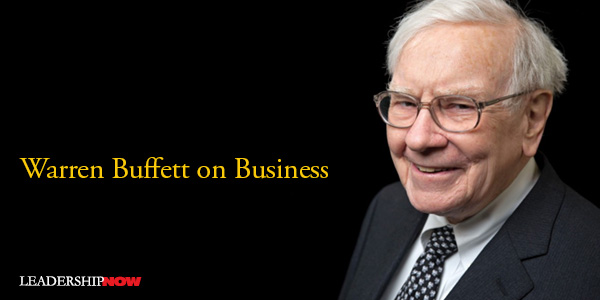 |
 |
12.21.09

Warren Buffett on Business
RICHARD CONNERS has done us a service by creating a collection of Warren Buffett’s writing and thoughts over the last 40 years. Warren Buffett on Business is a selection Berkshire Hathaway letters written over the last 40 years and the occasional Buffett interview or comment. Conners has categorized these into 18 topics like corporate culture, executive compensation, executive behavior, risk management, mistakes I’ve made, and humor and stories. Conners, who teaches a course on Warren Buffett at Washington University in St. Louis says Buffett’s “genius is in his character. His integrity is unsurpassed. His patience, discipline, and rationality are extraordinary.” Here are a few business principles in Buffett’s own words: It takes 20 years to build a reputation and five minutes to ruin it. If you think about that, you’ll do things differently. I think we have a very good culture virtually everyplace in Berkshire. I hope it’s everyplace. This is what we are looking for, and it’s more a question of culture than controls. If you have a good culture, I think you can make the rules pretty simple. An observer might conclude from our hiring practices that Charlie and I were traumatized early in life by an EEOC bulletin on age discrimination. The real explanation, however, is self-interest: It’s difficult to teach a new dog old tricks. The many Berkshire managers who are past 70 hit home runs today at the same pace that long ago gave them reputations as young slugging sensations. Therefore, to get a job with us, just employ the tactic of the 76-year-old who persuaded a dazzling beauty of 25 to marry him. “How did you ever get her to accept?” asked his envious contemporaries. The comeback: “I told her I was 86.” We cherish cost-consciousness at Berkshire. Our model is the widow who went to the local newspaper to place an obituary notice. Told there was a 25-cent-a-word charge, she requested “Fred Brown died.” She was then informed there was a seven-word minimum. “Okay” the bereaved woman replied, “make it ‘Fred Brown died, golf clubs for sale.’” I’ve said many times that when a management with a reputation for brilliance tackles a business with a reputation for bad economics, it is the reputation of the business that remains intact. I just wish I hadn’t been so energetic in creating examples. My behavior has matched that admitted by Mae West: “I was Snow White, but I drifted.” My most surprising discovery: the overwhelming importance in business of an unforeseen force that we might call “the institutional imperative.”… I thought…that decent, intelligent, and experienced managers would automatically make rational business decisions. But I learned over time that isn’t so….For example:
Institutional dynamics, not venality or stupidity, set businesses on these courses, which are too often misguided. It’s no sin to miss a great opportunity outside one’s area of competence. I tell students to do work for an organization you admire or an individual you admire, which usually means that most MBAs I meet become self-employed. 
Posted by Michael McKinney at 07:36 AM
|
BUILD YOUR KNOWLEDGE
 

How to Do Your Start-Up Right STRAIGHT TALK FOR START-UPS 
Grow Your Leadership Skills NEW AND UPCOMING LEADERSHIP BOOKS 
Leadership Minute BITE-SIZE CONCEPTS YOU CAN CHEW ON 
Classic Leadership Books BOOKS TO READ BEFORE YOU LEAD |